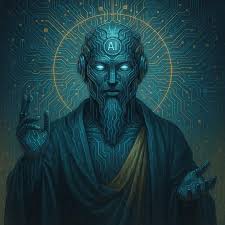AI Is the New God, But It’s Running Out of Energy

By Matt Stone
Entropy, Faith, and the Machine That Never Dies
Every civilization believes it will be the last one to fall.
Rome believed it. The Church believed it. The modern world believes it too.
We tell ourselves that progress is permanent, that systems can be perfected, that what we have built will outlast us. But nothing built by human hands, faith, or code can escape the quiet pull of entropy. Everything burns eventually. Not only physically but spiritually, economically, and psychologically. Every structure that promises eternal order is already unraveling.
1. The Fire Beneath Every System
Entropy is not chaos. It is the cost of order. It is what happens every time something organizes energy into a form: a cell, a city, a belief system. Order requires work, and work requires energy, and energy is never free. The universe pays for structure with heat.
Every living thing is a temporary dam against the flood of entropy. We eat, think, and build as a way of holding back the tide for a while. Even stars do it. They fuse elements, burning themselves alive to make the light that allows life to exist.
Civilizations work the same way. They begin with vision and heat. Someone dreams of unity or salvation or efficiency, and people gather around that dream. They build systems to protect the fire: laws, rituals, currencies, technologies. For a while the forms hold. Then they start to leak. Then they begin to feed on themselves.
That is where we are now. The fire has started to consume its container.
2. The Theology of the Machine
Modernity promised to deliver us from myth, but it only gave us new gods with better branding.
Where older civilizations worshiped sun and sky, we worship data and growth. Our cathedrals are server farms. Our priests are programmers. Our hymns are updates and quarterly earnings calls.
The religion of progress has its own theology of salvation. The faithful call it innovation, optimization, or disruption, but the promise is the same one every priest has made since the beginning: if you obey the system, it will save you from decay.
There is no salvation in acceleration. There is only heat. Every line of code, every server rack, every lithium battery is a prayer to the same false god: infinite energy. The idea that we can build faster than we burn. That cleverness can outsmart entropy.
It is the oldest story in the world. The Tower of Babel, translated into silicon and light.
3. The Algorithmic Sacred
For years I have tried to understand why our faith keeps reappearing in new forms. We no longer speak of grace or divine providence. We talk about trustless networks, transparency, and decentralization. Yet the structure of belief is the same.
In theology, God was the guarantor of truth.
In modernity, gold was.
Now, code is.
Each new order answers the same human question: how do you build faith in something you cannot see?
That question drives what I call the algorithmic sacred. The blockchain is a cathedral made of electricity. The economy becomes a liturgy of verification. Every transaction is a confession. Every hash is a prayer.
But every theology hides a cost. The system consumes vast amounts of energy to sustain the illusion of permanence. It is an entropic machine in metaphysical clothing. It burns the world to prove it can outlast the world.
Entropy does not vanish when you digitize it. It simply moves. It leaks into the atmosphere, the power grid, and the human nervous system. The anxiety we live with is the heat the machine gives off.
Faith and the Fear of Loss
Behind every belief system—religious, political, or technological—is the same fear: the fear of loss.
Loss of control.
Loss of meaning.
Loss of life.
Entropy is unbearable because it reveals that nothing lasts. Every myth of eternity—heaven, profit, progress—is an attempt to bargain with that truth.
The more we try to escape loss, the more destructive we become. The denial of entropy accelerates entropy. The refusal to die becomes a death drive.
You can see it in every layer of modern life.
In economics, we print imaginary value to hide material decline.
In ecology, we burn ancient carbon to sustain the illusion of growth.
In daily life, we scroll and optimize and consume to escape silence.
All of it is the same pattern. The same panic. The same attempt to build a firewall against impermanence.
But we cannot stop the fire by pretending it does not exist.
Living with the Burn
When I was younger, I thought meaning came from permanence. I thought peace meant finding something solid that could never be taken. Sobriety taught me otherwise.
Everything that has ever mattered in my life began with loss.
Addiction burned away illusion. Recovery burned away control. Every collapse revealed something more real underneath. I began to understand entropy not as destruction but as refinement—the way the universe edits itself through fire.
Crockett says entropy is the cost of energy becoming itself.
Thomas Nail says the cosmos evolves to increase dissipation, not decrease it.
Both are right. Life does not resist entropy. Life is the art of cooperating with it.
That is what creation really is: the ability to turn heat into form, to let energy move through you instead of pretending you can possess it. That is why writing, art, and love feel sacred. They are acts of graceful burning. The flame does not stop. It simply changes color.
The Market, the Cloud, and the Ghost of God
The global market is a theology of infinite circulation. The cloud is its metaphysical heaven, promising infinite memory and infinite growth. But these are illusions of eternity built on finite energy. Every upload, every transaction, every innovation carries the quiet cost of entropy.
The world believes it is becoming smarter. In truth, it is becoming hotter.
Each digital miracle adds a layer to the atmosphere. Each claim of permanence leaves another scar on the land.
The old theologians called God the unmoved mover. Modernity calls it the self-correcting algorithm. Both are fantasies of control. Both hide the reality that everything moves, everything burns, everything changes.
We are still worshiping order in a universe that only promises motion.
7. The Grace of Entropy
But entropy is not the enemy. It is the hidden teacher. It reminds us that creation and collapse are the same process viewed at different speeds.
Stars collapse and give birth to heavier elements. Forests burn and fertilize the soil. Love ends and opens the heart to new life.
Maybe our task is not to stop entropy but to practice it consciously.
To live with open hands.
To create beauty that knows it will die.
To build systems that breathe instead of hoard.
Faith once meant belief in what endures. Perhaps now faith means trust in what changes. To love the world enough to let it go.
Entropy is not just a physical law. It is a spiritual rhythm. It tells us that everything returns, everything transforms, and nothing is truly lost.
The machine never dies. It only changes form. And neither do we.


Comments ()